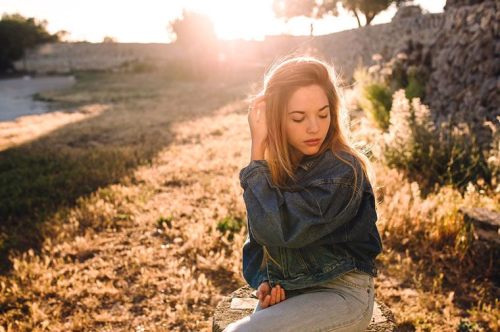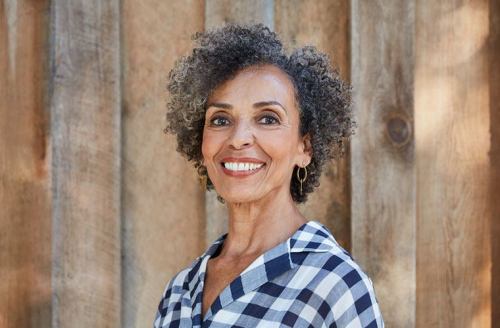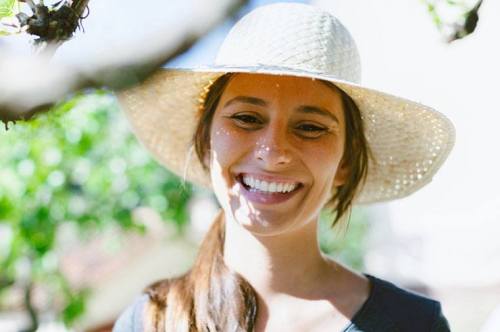When you choose a shampoo because the label claims it’ll give you shiny locks, or a toothpaste because it promises a whiter smile, you expect to get what you paid for. But when you buy a moisturizer that touts its anti-aging effects, you’re setting yourself up for failure.
“Anti-aging” is inherently an impossibility. You can make a weekly appointment with your facialist, slather on retinol, and get those doctor-recommended eight hours of sleep every night, but the truth is, everyone is aging with each passing second. All of the beauty products and Botox in the world can’t prevent that.
In August, Allure editor in chief Michelle Lee announced that the term would be banned from all of the publication’s future stories. By using it, Lee wrote in her editor’s letter, “we’re subtly reinforcing the message that aging is a condition we need to battle—think antianxiety meds, antivirus software, or antifungal spray.” Her move is a positive one, no question, but it won’t be easy to erase the term from the vocabularies of those who have been seeing it on labels and in magazines since they first began paying attention to such things. For me, that was as a preteen.
I’ve been taught that I need to do what it takes to try and stay looking as young as possible forever.
I’ve been told I look younger than my actual age for my entire life—and I’ve always looked up to my mom, who’s regularly mistaken for my sister—but “anti-aging” is still a real concern of mine. On the cusp of 30, I’m admittedly reaching for my at-home microneedling device, layering on stronger serums, and massaging my face more—all to help reduce those fine lines and wrinkles we hear so much about (and which I swear are starting to creep into my forehead and next to my eyes).
I can’t help it—I’ve been taught that I need to do what it takes to try and stay looking as young as possible forever.
“Language matters,” Lee wrote in her announcement. But will wiping “anti-aging” from the lexicon truly give women a healthier outlook on growing older? Will Allure‘s move cause a permanent shift in the way the beauty industry speaks to its consumers?
I spoke with several industry vets to see how the conversation about anti-aging could change the beauty landscape.

The problem with “anti-aging”
When you stop and really think about it, the beauty industry’s obsession with anti-aging is bizarre. “Nobody judges us because we breathe oxygen, or because we require calories and water to continue living,” says Sarah Villafranco, MD, founder of Osmia Organics. “Those are just biological facts of human existence. Perhaps the only thing more certain than those facts is the inevitable passage of time, and our lack of ability to stop it. So why on earth are we judging each other for [time’s] effect on the human body?”
This Parisian Skincare Brand Is Launching in the United States for the First Time—Here’s What a Derm Wants You to Know

We’re Calling It: Cleansing Balms Are the Face Wash of the Future—Here Are 3 to Add to Your Cart

This Is the One Product That Scarlett Johansson Always Keeps in Her Purse and on Her Bedside Table

You keep the organs that facilitate these necessary processes—your lungs for breathing, your GI tract for digesting those calories—healthy by exercising, eating well, and avoiding toxic substances. And the way we care for our skin (the body’s largest organ) should be no different, Tiffany Masterson, founder of clean beauty brand Drunk Elephant, says. “We must allow it to thrive by giving it antioxidants and more biocompatible, reparative, and anti-inflammatory ingredients. We avoid the disruptive ingredients that set skin up to age rapidly.”
What if you made it your goal to protect and nourish your skin—not stop time?
Joanna Vargas, celebrity facialist and founder of her eponymous skin-care brand, is of a similar mind. “Aging is sort of a misused term,” she says. “I always explain to people that diet, sunlight, and pollution contribute to cell mutation, which is what we all don’t like to see in the mirror.” Meaning, time can dull your skin, sure, but outside forces make a more visible impact.
So, what if you made it your goal to protect and nourish your skin—not stop time? (This isn’t Westworld.) “You’ll have skin that ages because it’s inevitable, but it will age gracefully and naturally, looking a lot healthier and youthful along the way,” Masterson says.

A healthier mindset
Masterson thinks it would be helpful to reposition products as “pro-skin” rather than “anti-aging.” “We are either for skin or against skin when choosing what we do to it on a daily basis,” she explains.
“I don’t think canceling the word [anti-aging] handles the deeper issues,” Vargas adds. “But perhaps for the younger generations it’s a great first step. Women need to feel we are all in this together.” Flipping the script could help you let go of your quest for perfection, and embrace your wrinkles.
After all, everyone should feel lucky to be aging. “It’s utterly absurd, if you really stop to think about it,” says Dr. Villafranco. “My crow’s feet don’t affect my compassion—if anything, they show that I’ve laughed and cried with those I love. My gray hair doesn’t affect my fitness—come spend a day with me in the mountains if you want proof. My slightly wrinkled elbows and knees do not affect my kindness, my love for my family, or my ability to guide and nurture a friend in need.”
Celebrate your muscles because they show your strength, and your skin because it shields you from the elements. All those fine lines you’ve been taught to smooth and firm are proof of your skin’s (and your) resiliency. “I choose to pursue and discuss healthy, beautiful aging,” Dr. Villafranco says. “I have only this body, and have always cared for it with respect—we all owe ourselves that commitment.”
Here’s why a new natural beauty brand built healthy aging into its DNA. And these are 10 reasons you might *feel* old, according to Dr. Frank Lipman.
Sign Up for Our Daily Newsletter
Get all the latest in wellness, trends, food, fitness, beauty, and more delivered right to your inbox.
Got it, you've been added to our email list.








